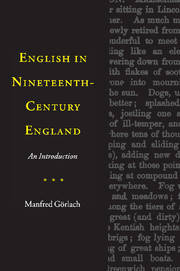Book contents
- Frontmatter
- Contents
- List of abbreviations
- Preface
- Acknowledgements
- List of figures
- List of texts
- 1 Introduction
- 2 Regional and social varieties
- 3 Spelling and pronunciation
- 4 Inflection
- 5 Syntax
- 6 Lexis
- 7 Text types and style
- 8 Provisional conclusions
- 9 Texts
- 10 Information on texts and authors
- References
- Index of names
- Index of topics and titles
- Index of selected words and pronunciations
6 - Lexis
Published online by Cambridge University Press: 17 May 2010
- Frontmatter
- Contents
- List of abbreviations
- Preface
- Acknowledgements
- List of figures
- List of texts
- 1 Introduction
- 2 Regional and social varieties
- 3 Spelling and pronunciation
- 4 Inflection
- 5 Syntax
- 6 Lexis
- 7 Text types and style
- 8 Provisional conclusions
- 9 Texts
- 10 Information on texts and authors
- References
- Index of names
- Index of topics and titles
- Index of selected words and pronunciations
Summary
Introduction
General considerations
‘I move that the meeting adjourn, for the immediate adoption of more energetic remedies – – ’ ‘Speak English!’ said the Eaglet.
It is very difficult to generalize about what characterizes the 19th-century vocabulary of English. How different it was from PDE is easily demonstrated from a few everyday contexts. Consider what people drank when not having ale, beer or wine, gin, tea, milk or water: Brook (1970:26) draws attention to the period-specific drinks bishop, negus, porter, flip, dog's nose and purl. Vehicles then available included a gig, stanhope, dog-cart, taxed-cart, chaise-cart, cabriolet, rumble and barouche, a selection to which the first edition of Roget's Thesaurus (1852:64) adds cariole, phaeton, curricle, whisky, landau, droshki, désobligeant, diligence, cab, calash, brougham, clarence and various others, certainly not exhausting the range of terms available.
The stylistic range of words found in print apparently increased in the period. That the lexis available ranged from very formal and Latinate to highly colloquial is illustrated by Roget's no. 584 (1852:134):
Loquacity, loquaciousness, talkativeness, garrulity, flow of words, flux de bouche, prate, gab, gift of the gab, gabble, jabber, chatter, prattle, cackle, clack, twattle, rattle, caquet, caqueterie, twaddle, bibble-babble, gibble-gabble. Fluency, flippancy, volubility, cacoëthes loquendi, polylogy, perissology.
As far as statistics of the growth of the vocabulary are concerned, we still largely rely on the figures of the Chronological English Dictionary based on the 1933 SOED (Finkenstaedt et al. 1970). In spite of the obvious limitations of the data-base, we can be confident that the number of new words per year is at least illustrative of the increase until 1850 or so.
- Type
- Chapter
- Information
- English in Nineteenth-Century EnglandAn Introduction, pp. 92 - 138Publisher: Cambridge University PressPrint publication year: 1999



